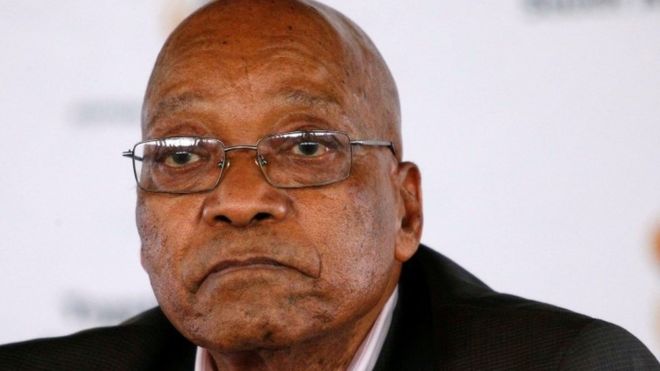JOHANNESBURG, (Reuters) – South African former President Jacob Zuma will stand trial on corruption charges relating to a $2 billion arms deal after a high court today denied him a permanent stay of prosecution.
The ruling by Judge Jerome Mnguni in Pietermaritzburg paves the way for Zuma’s long-awaited trial to start on Oct. 15.
The case is a rare example of an African leader being held to account for his actions. Zuma denies wrongdoing.
Zuma, in office from 2009-2018, had applied for a permanent stay of prosecution on 18 charges of fraud, racketeering and money laundering relating to a deal to buy European military hardware for South Africa’s armed forces in the 1990s.
In May, Zuma’s lawyers argued that the 77-year-old had been treated unfairly by prosecutors and was a victim of a politically motivated witch-hunt.
On Friday, Judge Mnguni dismissed an application by Zuma and his co-accused, French arms dealer Thales, to have the charges set aside permanently with costs. This means they will pay legal costs related to the application and hiring lawyers.
Thales said it was reviewing the judgement with its lawyers and would assess its legal options.
Zuma’s spokesman and a lawyer representing him were not immediately available for comment. Zuma and Thales have 15 days to appeal.
The National Prosecuting Authority (NPA) respected the findings of the court, a spokeswoman told state broadcaster SABC news.
The charges against Zuma were originally filed a decade ago but then set aside by the NPA shortly before he successfully ran for president in 2009.
After his election, his opponents fought a lengthy legal battle to have the charges reinstated, finally succeeding in 2016. Zuma countered with his own legal challenges.
The official opposition party, the Democratic Alliance (DA), which has been at the forefront of the legal fight, welcomed the decision, saying: “We are encouraged by the ruling of the court to believe that Zuma will eventually have to face his day in court.
“The DA will not rest until justice has been done.”
The speed with which prosecutors moved against Zuma of late is a sign of his waning influence since he was replaced as head of state by Cyril Ramaphosa, his former deputy.
Ramaphosa has made the fight against corruption a priority as he seeks to woo foreign investment and revamp the economy.









